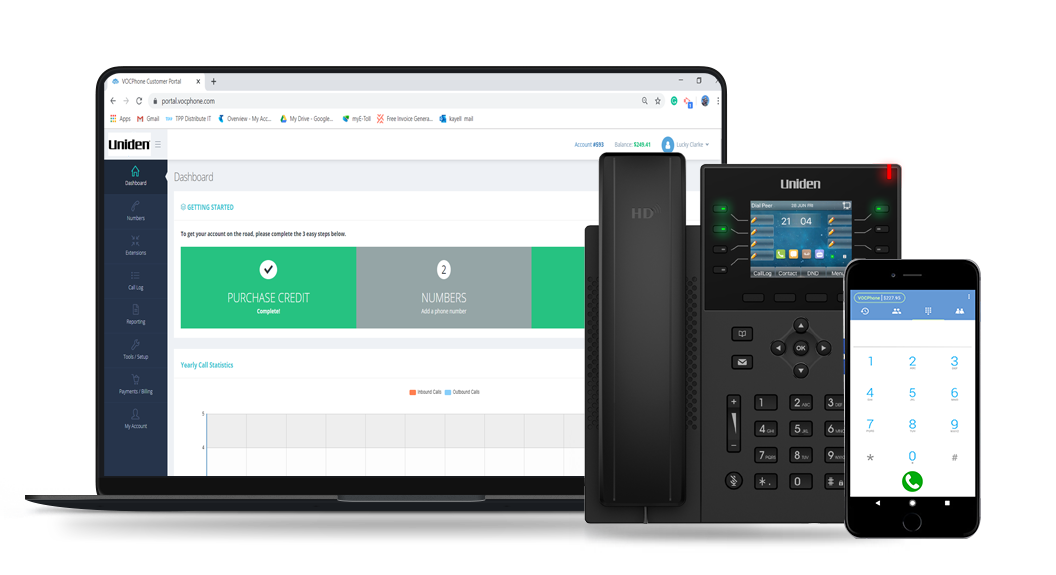
Wired vs wireless business phone handsets: Making the right choice
Explore the key differences between wired and wireless options to select the right option to enhance your business communications.

Explore the key differences between wired and wireless options to select the right option to enhance your business communications.
As technology and working environments evolve, companies face the decision between traditional wired phone systems and modern wireless solutions. This choice can significantly impact productivity, flexibility, and overall operational efficiency.
For instance, 90% of Australians stated they would like to continue working from home. If businesses move to a more hybrid working scenario, then wireless phones could be the way forward. The same applies to employees working out of an office who aren’t always stationary.
Wired phone systems have long been the backbone of business communications, offering reliability and consistent call quality. However, wireless handsets have gained popularity due to their mobility and advanced features, catering to the evolving needs of modern workplaces.
Let’s explore the key differences between wired and wireless business phone handsets, helping you make an informed decision for your company's communication infrastructure.

Wireless handsets allow employees to move freely around the office or work remotely while staying connected. This flexibility improves productivity by enabling staff to take calls from anywhere within range. In contrast, wired phones are limited to fixed locations, potentially hindering communication in dynamic work environments. Wireless solutions support the modern trend of hot-desking and flexible workspaces, adapting to evolving office layouts and work styles.
Expanding a wireless phone system is significantly easier than wired phones. Adding new wireless handsets doesn't require complex cabling or infrastructure changes, making it ideal for growing businesses or those with frequently changing office layouts. Wired systems often involve time-consuming and costly installation, especially in larger offices or multi-story buildings. Wireless solutions offer plug-and-play convenience, reducing downtime during system expansions.
While the initial investment in wireless handsets may be higher, they often prove more cost-effective in the long run. Wireless systems eliminate the need for extensive cabling infrastructure and reduce maintenance costs. Many wireless solutions also integrate with cloud-based phone systems, offering advanced features without the need for expensive on-premises hardware. Wired systems may incur ongoing costs for line rental and maintenance, which can add up over time.
Wireless handsets are often equipped with advanced features that integrate with other business technologies. These may include compatibility with CRM software, voicemail-to-email transcription, and mobile app integration. Such features enhance productivity and streamline workflows. While some modern wired systems offer similar capabilities, wireless solutions generally provide more substantial integrations, aligning better with today's digital-first business environments.
Gain valuable insights into call patterns, durations, and peak times to optimise staffing and improve customer service performance.
Seamlessly transition from voice calls to video meetings, fostering better collaboration and personal connections with remote team members.
Receive voicemail messages as email attachments or transcripts, allowing for quicker response times and easier message management.
Access your cloud business phone system from anywhere using a smartphone app, ensuring connectivity even when out of the office.
Easily record and store important calls for training, quality assurance, or compliance purposes, with secure cloud storage options.
Uniden's wireless business phone systems combine cutting-edge technology with user-friendly interfaces, ensuring seamless adoption across organisations of all sizes. From small startups to large corporations, we provide scalable solutions that grow with your business.
By choosing Uniden, businesses can benefit from expert support and ongoing innovation in the field of wireless communications.

Ready to revolutionise your business phone system? Contact us now to learn how our wireless handsets can transform your company's communications.
Modern wireless handsets have come a long way in terms of reliability. While wired phones may have a slight edge in certain environments, the difference is often negligible for most business settings. Advanced wireless technologies ensure clear, secure communications that rival their wired counterparts.
Yes, many wireless handsets are designed to integrate seamlessly with various business software solutions, including CRM systems, email platforms, and productivity tools. This integration can enhance workflow efficiency and improve overall communication capabilities.
Yes, in most cases, you can retain your existing phone numbers when transitioning to a wireless system. This process, known as number porting, ensures continuity in your business communications and minimises disruption during the switch.
Absolutely. Wireless handsets, especially when paired with cloud-based phone systems, are highly scalable and ideal for businesses with multiple locations. They offer centralised management, easy expansion, and consistent features across all sites.
While softphones (software-based phone applications) offer flexibility for remote work, wireless handsets provide a dedicated device for business calls, often with superior audio quality and ergonomics. Many businesses use a combination of both to cater to different needs and preferences within their workforce.